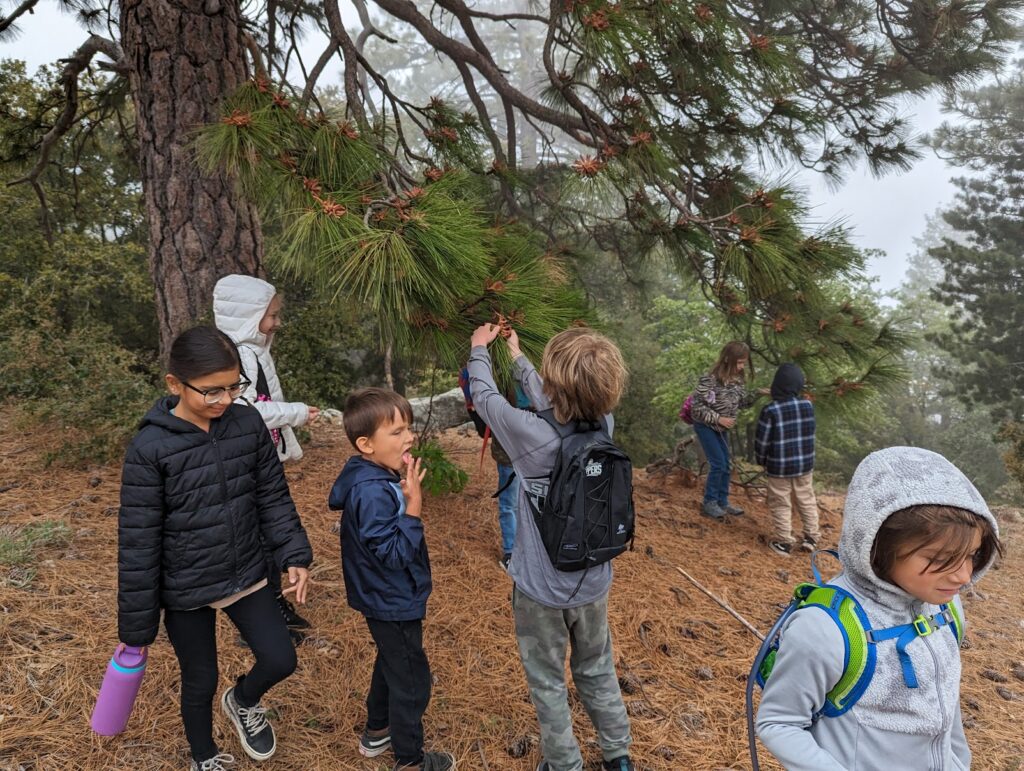Our ongoing preschool, homeschool, and after-school Nature-Based Science and Nature Connection courses support children playing and learning in nature. Through play, they develop an understanding of, and respect for, the deep interrelatedness of living and non-living things. Throughout the sequence of courses, children build on their developing love of the natural world to take on the role of guardians of Mother Earth at this critical moment in human history and learn content specified in the CA K-8 science standards. As a permaculture designer, I integrate permaculture principles, ethics, concepts, and practices throughout this sequence. Nature-Based Science is taught by Peter Kindfield.
Classes require at least six students and we try to cap all of our classes at 8 students.
Nature-Based Science is an outdoor, in-person class.
Our 10-week Fall ’24 session will start the week of September 8 and end the week of November 11. The week of November 25th is Thanksgiving break. The week before TG week (November 18th) and the 3 weeks after TG week (December 2nd, 9th, and 16th) will be used for make-up sessions should the need arise. As of now, we have openings in both our Tuesday 1:30-3:30 and Wednesday 2:30-4:30 classes.

The activities described below are designed to be playful and to address both a deep understanding of interrelatedness and many elementary and middle school state science standards.
Courses: Our ongoing Nature-Based Science courses will involve observing and interacting with each other, other animals, plants, fungi, and Mother Earth. These activities will include building soil; cleaning the atmosphere; preserving water; growing, gathering, and preparing food; and building structures using natural materials.
Groups: This Spring both our Tuesday and Wednesday classes will be multi-aged for 5-14 year-olds.
Combined Elementary Middle School Course (5-14 years old): We focus on observing and interacting with nature including playfully learning the names of living and non-living components of ecosystems; growing, gathering, preparing, and eating food; and working and building with natural materials. As students play and work they will come to understand the Earth as a system consisting of relationships between various spheres (the lithosphere, atmosphere, hydrosphere, and biosphere) that can be described in terms of material cycles (e.g., the water, carbon, oxygen, nitrogen, potassium, phosphorous, and sulfur cycles) and energy flows. Their early focus on Earth care extends to understanding our impact on those material cycles (anthropogenic changes). Cost is $360.
Connection to Science Standards
Not only are the knowledge and skills that learners develop in our preschool and homeschool Nature-Based Science courses central to the survival of humanity and many other species, they also relate directly to the core ideas of the K-8 science standards. In addition, these courses introduce basic chemistry, physics, biology, and earth science. A small sample of the many disciplinary core ideas from the CA Next Generation Science Standards – addressed by our Nature-Based Science courses:
K: Things that people do to live comfortably can affect the world around them. But they can make choices that reduce their impacts on the land, water, air, and other living things.
3rdgrade: A variety of natural hazards result from natural processes. Humans cannot eliminate natural hazards but can take steps to reduce their impacts.
6thgrade: Water continually cycles among land, ocean, and atmosphere via transpiration, evaporation, condensation and crystallization, and precipitation, as well as downhill flows on land.
8thgrade: Typically as human populations and per-capita consumption of natural resources increase, so do the negative impacts on Earth unless the activities and technologies involved are engineered otherwise.
To reserve a spot in one of these classes, please contact us.